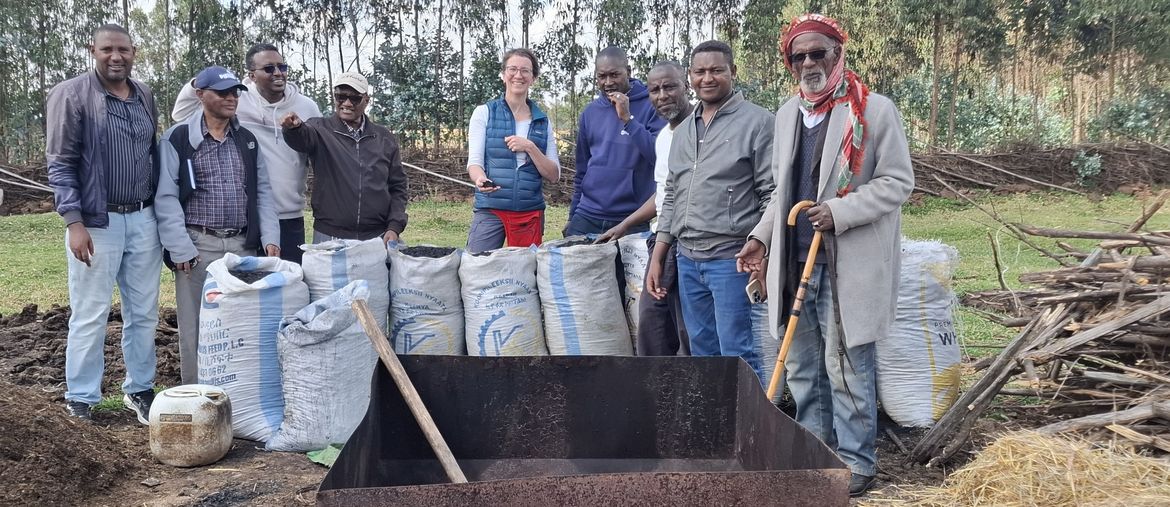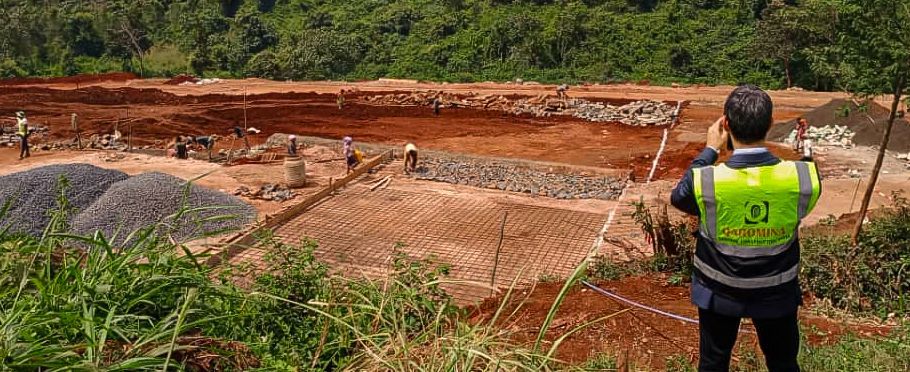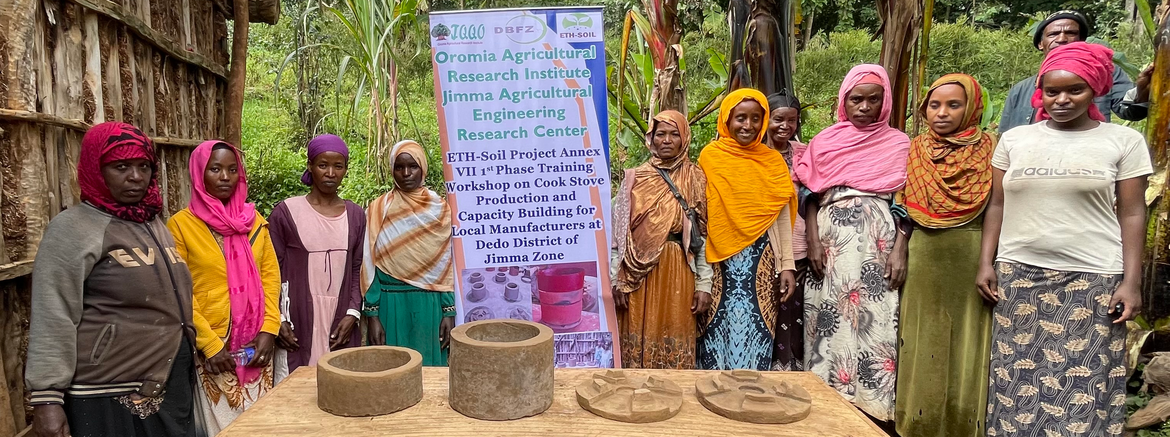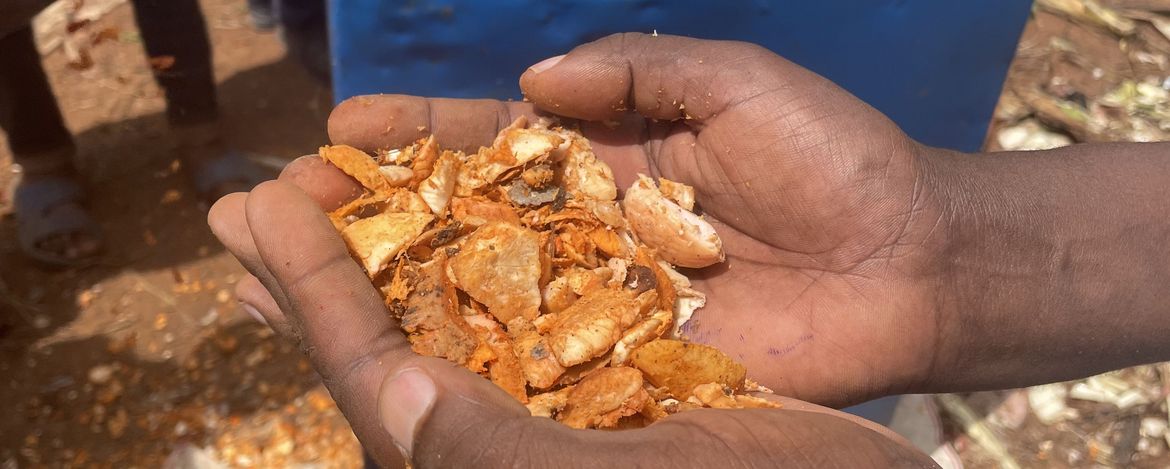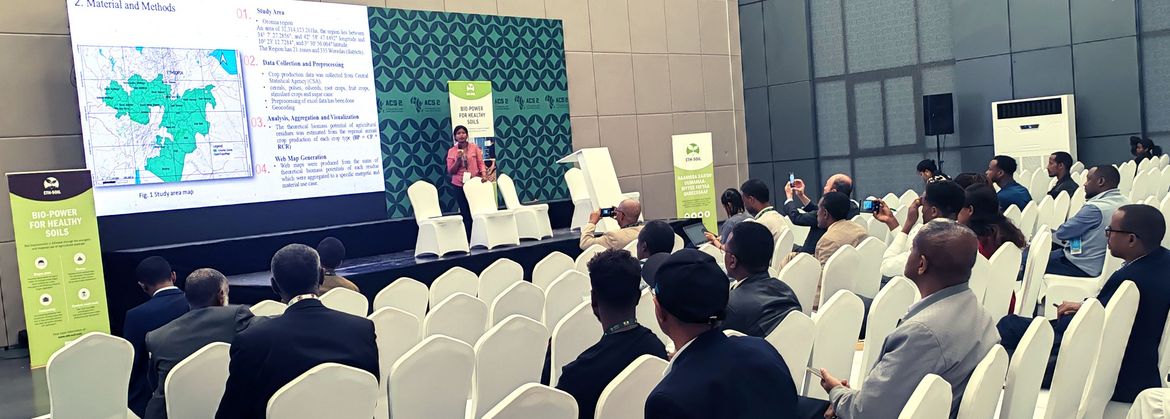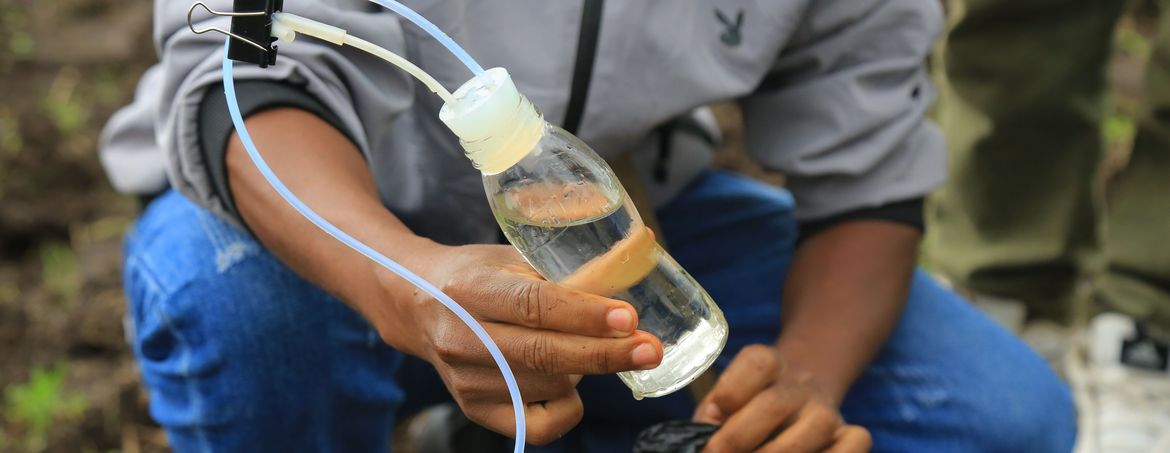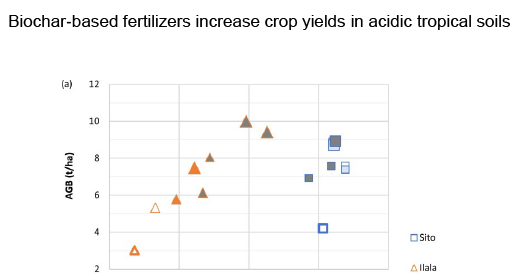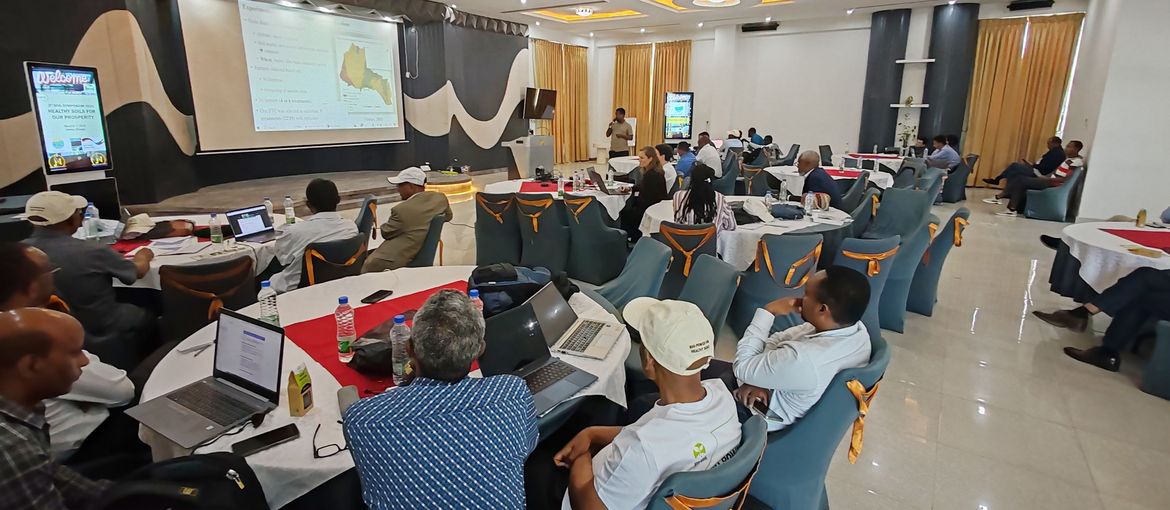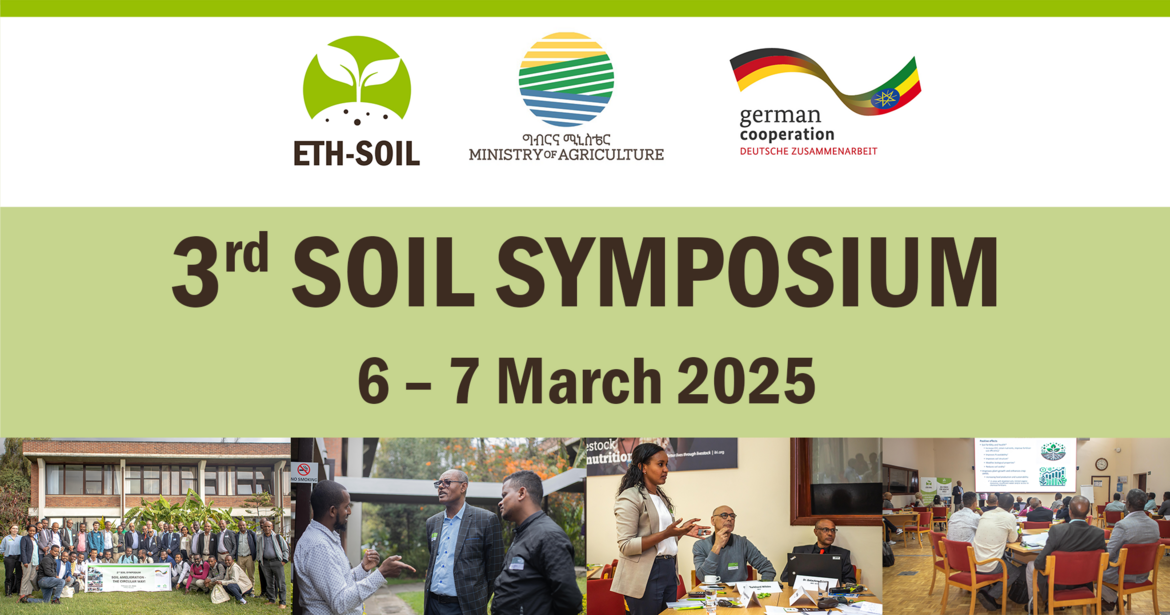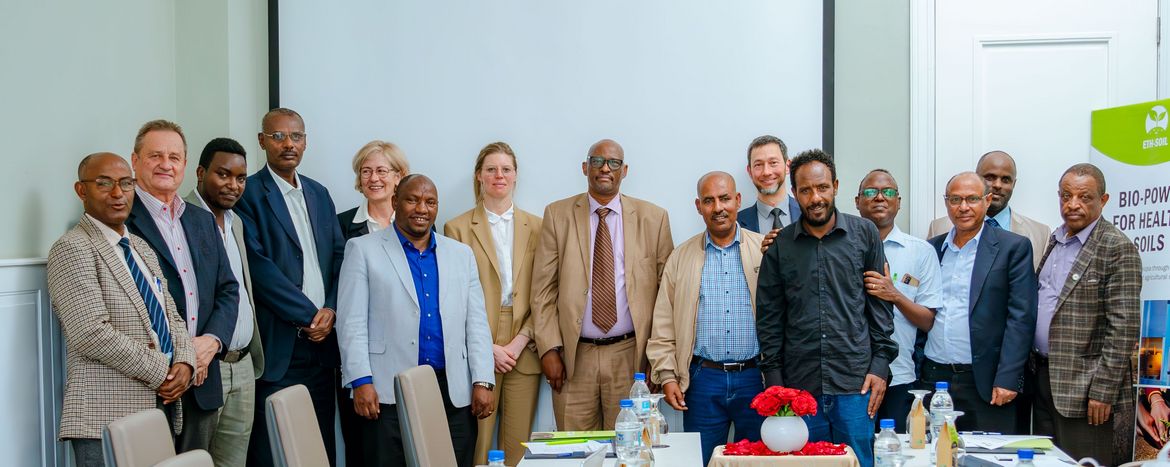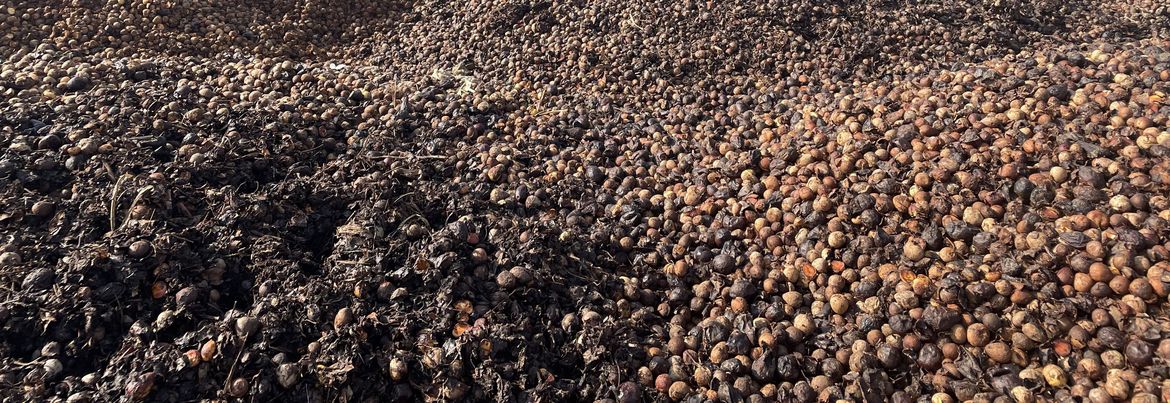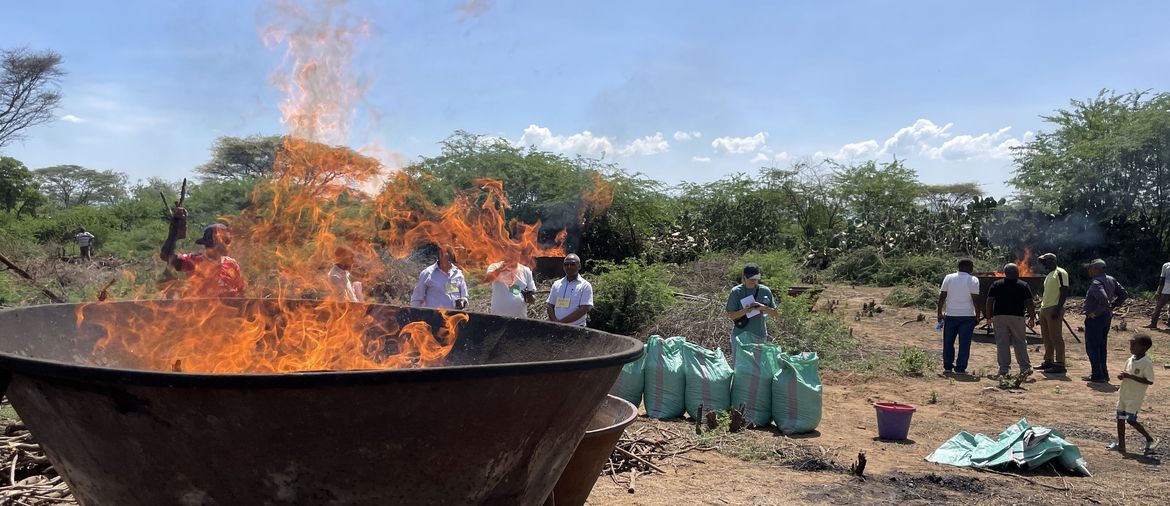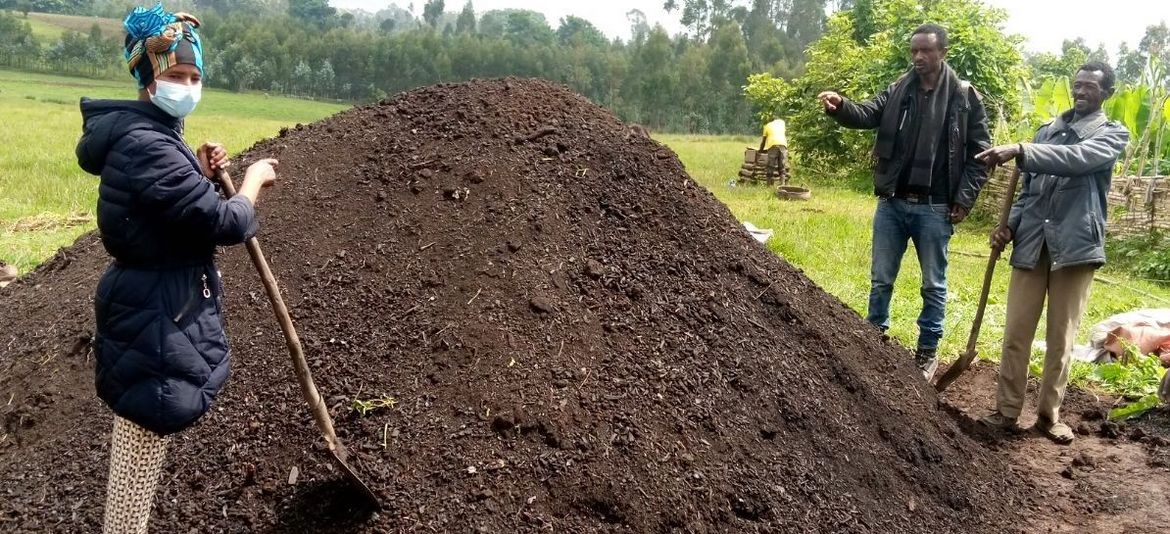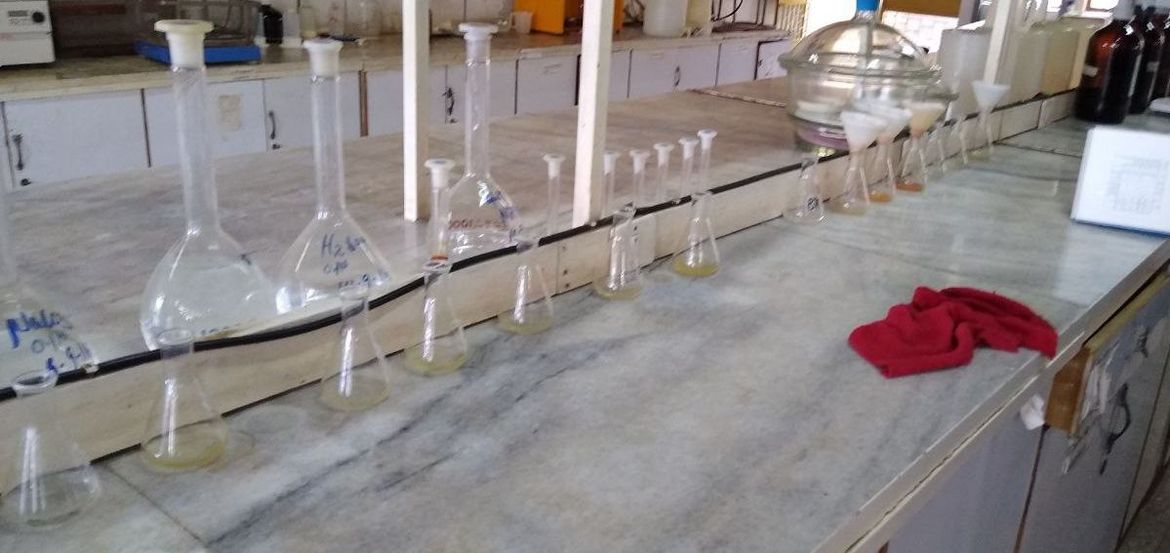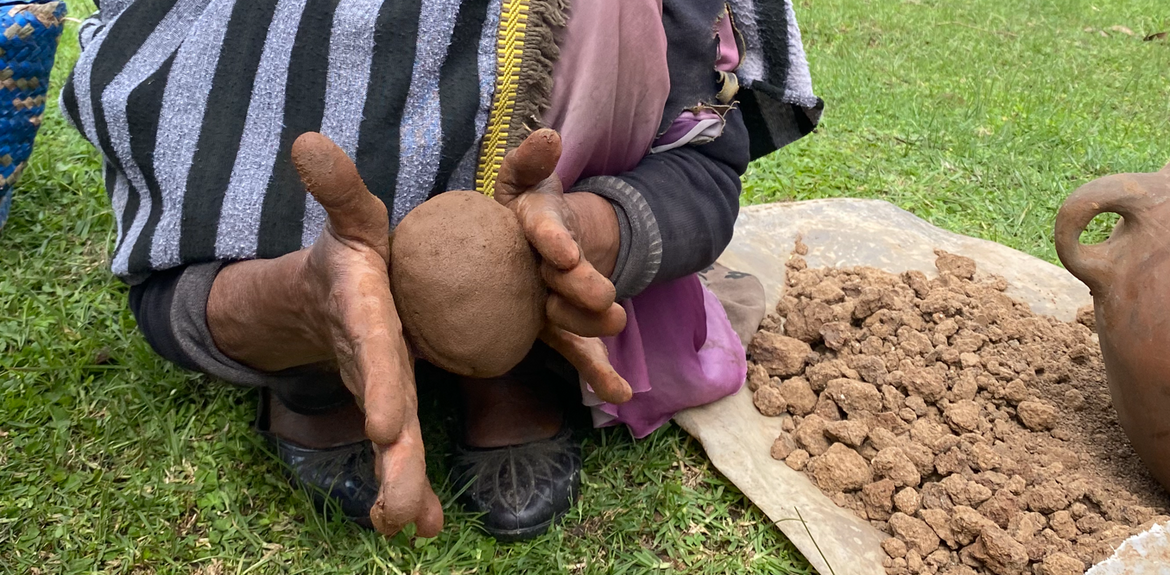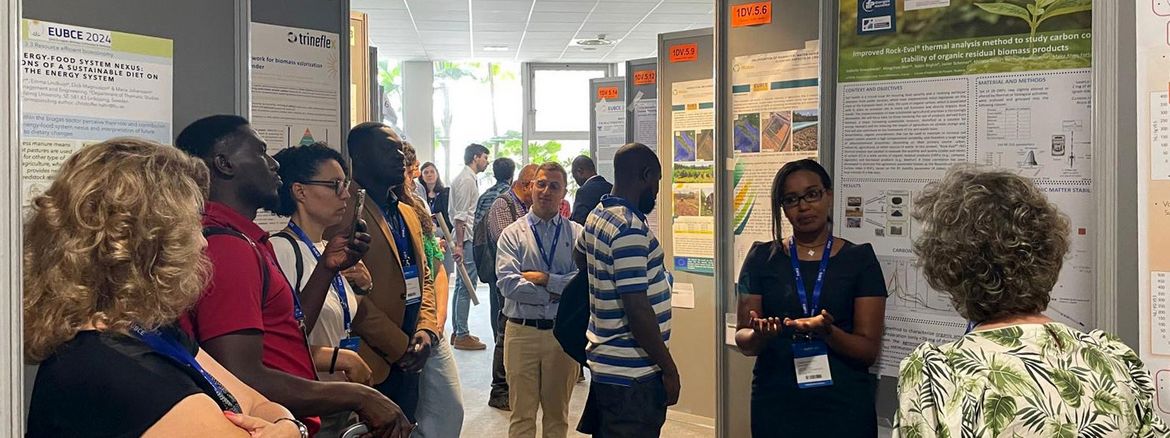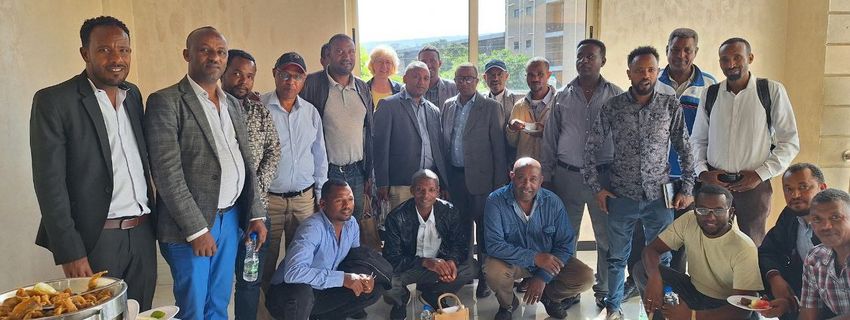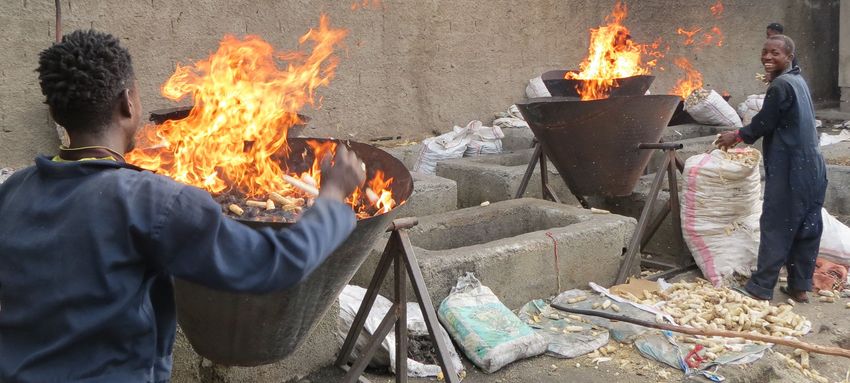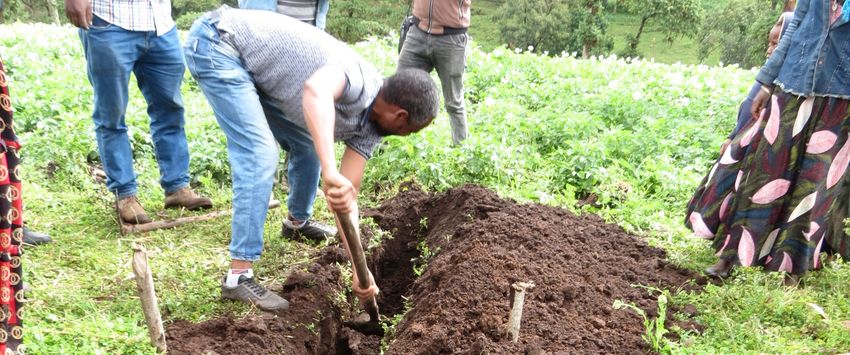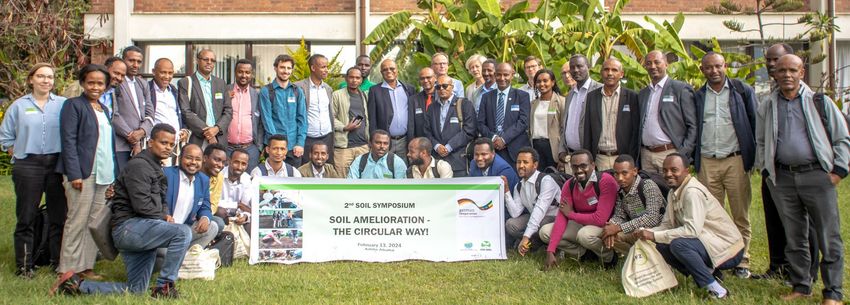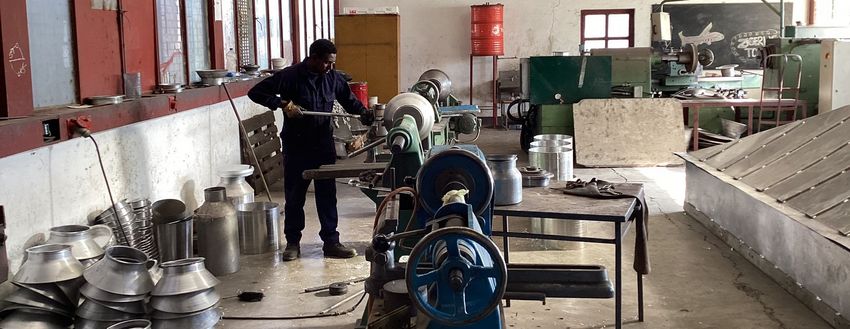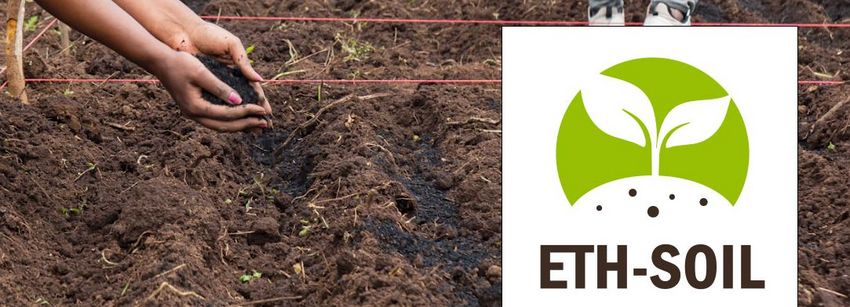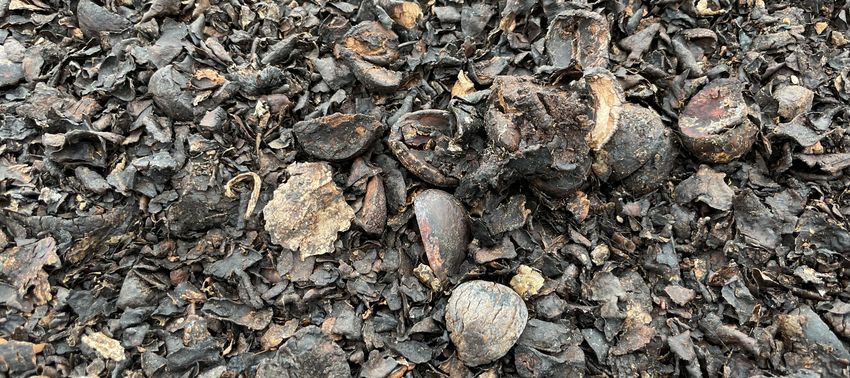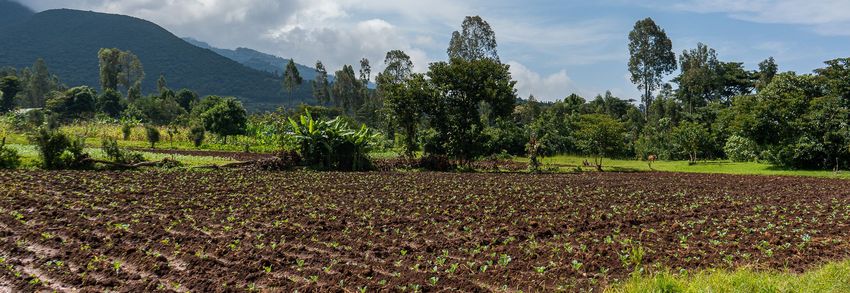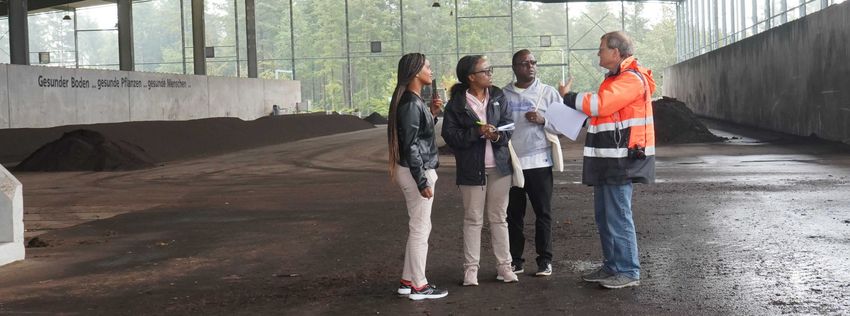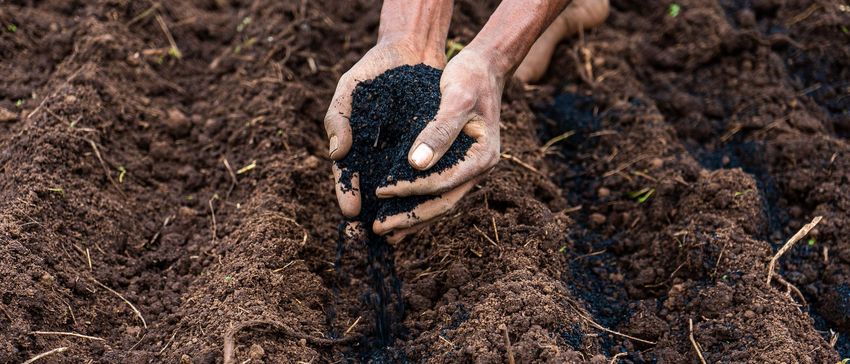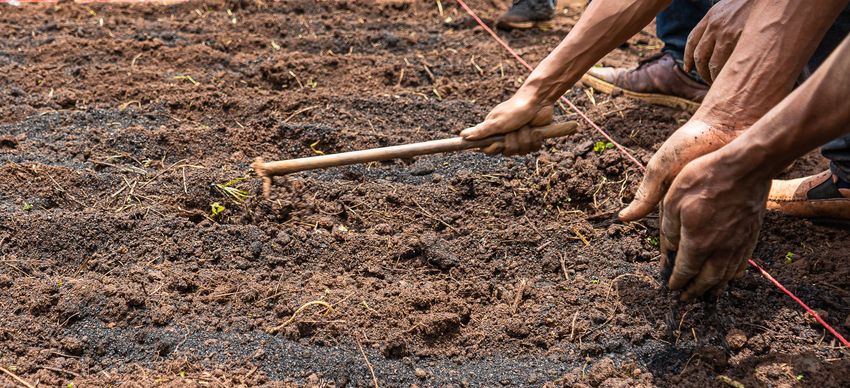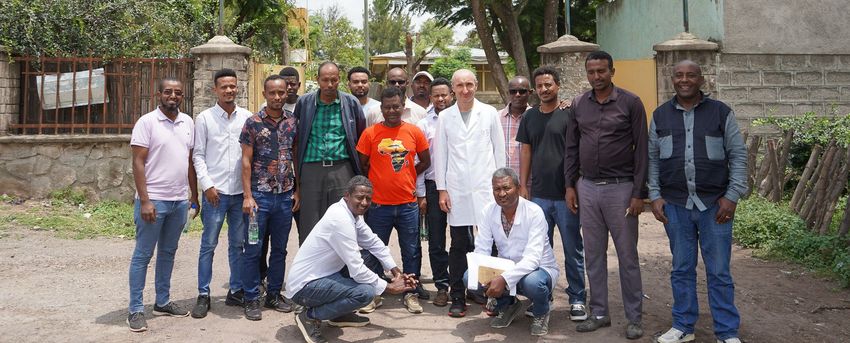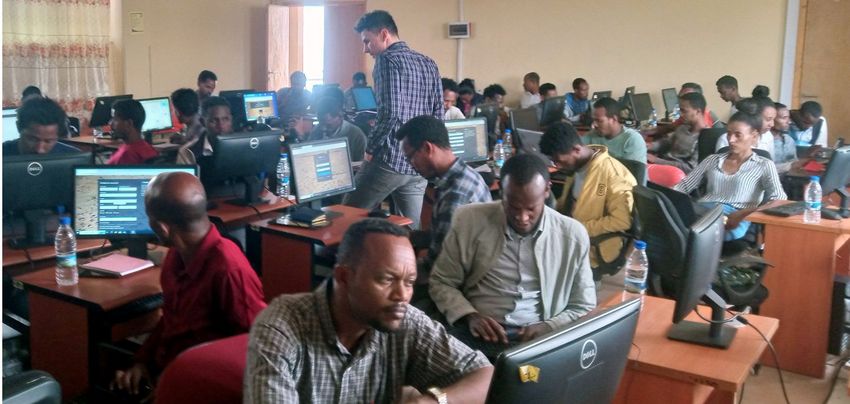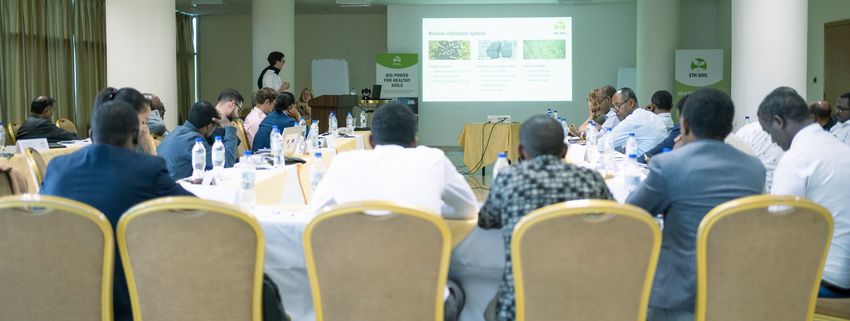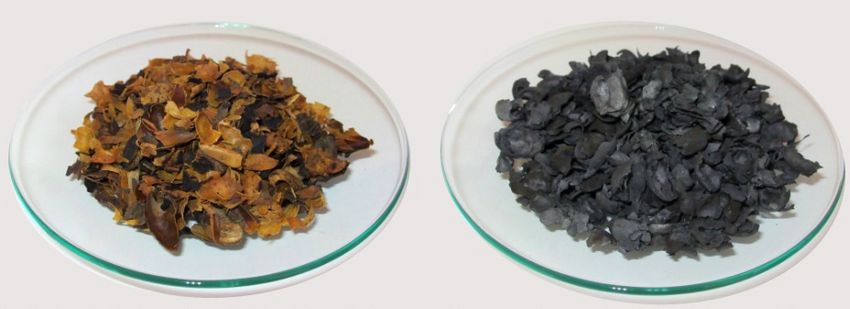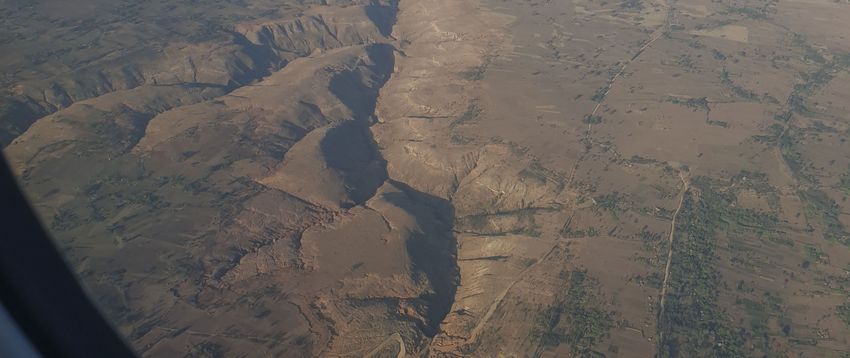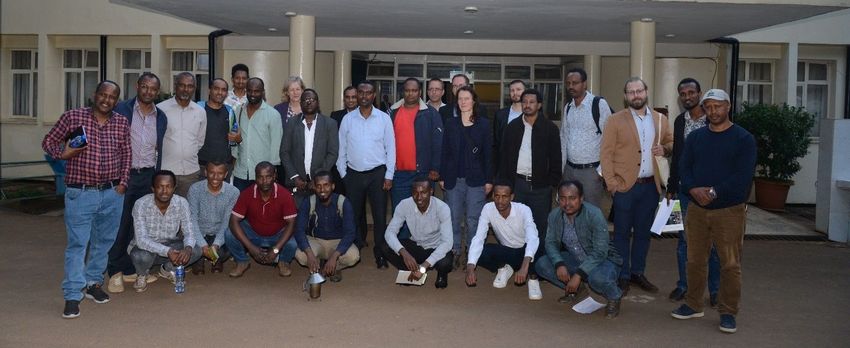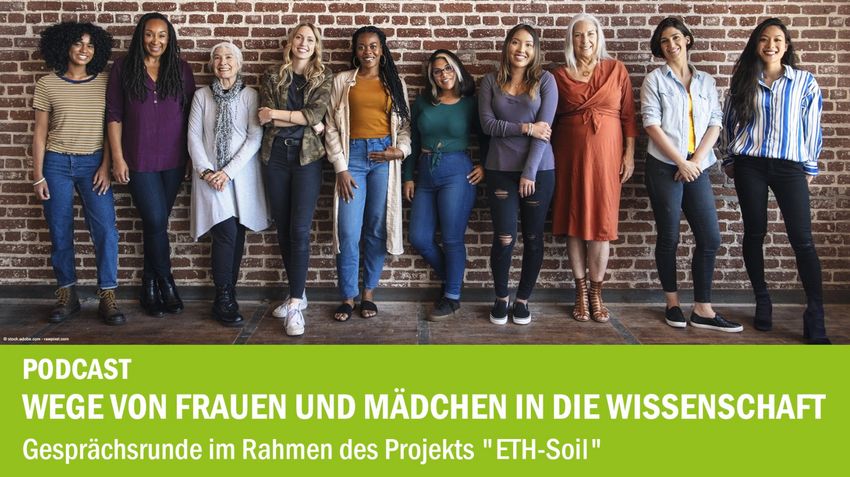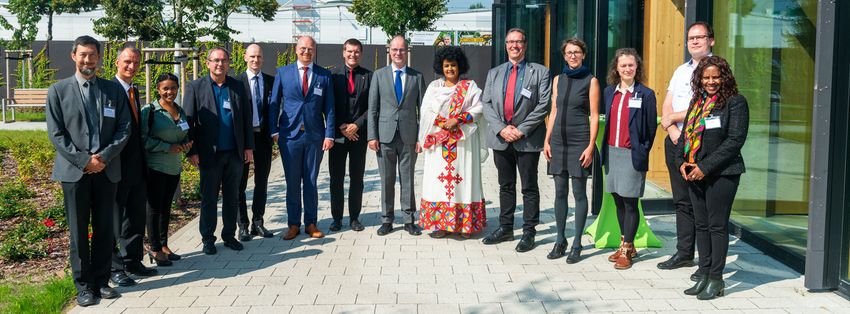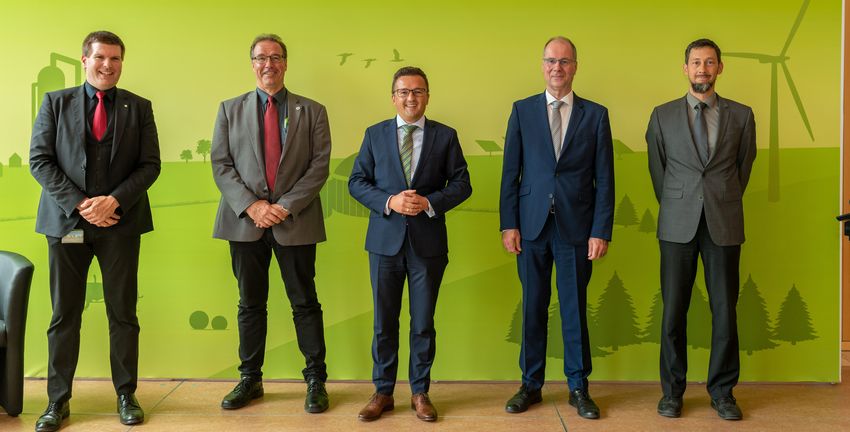News
19.12.2025 In Oromia, Ethiopia, the ETH-Soil project is taking an important step toward sustainable agriculture and voluntary carbon market participation. Since early this year, the project has been implementing C-Sink Certification for decentralized biochar production and application by smallholder farmers. In close collaboration with partners from the Ministry of Agriculture, Bureau of Agriculture Oromia, Sidama Bureau of Agicultural and Natural Resource Development ANRDB, Oromia Agricultural Research Institute OARI, and Jimma University, farmers, multipliers and observers were trained in biochar production, field application, and systematic documentation using the PlantVillage App as digital monitoring, reporting and verification tool.
02.12.2025 Construction has officially started on the new research and training biogas plant at Jimma University. This ETH-Soil-promoted extension of research infrastructure is a significant step toward strengthening Ethiopia’s capacity in sustainable energy and soil innovation.
23.10.2025 One of ETH-Soils's goal is to provide clean and sustainable cooking energy for rural households. By employing clay as building material and biogenic residues as fuel, the ETH-Soil cookstove model uses readily available, cheap resources to work towards healthy and climate-friendly technologies
01.10.2025 Sidama is one of the most productive agricultural regions of Ethiopia but is facing serious challenges due to climate change, soil depletion and acidification. To combat the degradation of soils and ensuing food insecurities, the ETH-Soil project facilitates the production and usage of biochar and compost from local agricultural and agro-industrial residues through farmer-participatory field trials.
18.09.2025 Competition for the attention of delegates and participants was very high during the Africa Climate Summit 2 organised by the African Union. Against this background, Lire Abiyo (Ministry of Agriculture, Ethiopia) and his team nevertheless managed to organise an official side event on digital tools for geographic biomass screening, on soil amendment and agricultural yield gains with biochar-based fertilizer. Within the framework of the ETH-Soil project, several DBFZ-teams were supporting these efforts on behalf of the Bundesministerium für wirtschaftliche Zusammenarbeit und Entwicklung (BMZ) since 2021.
21.08.2025 From 5 August 2025 to 14 August 2025, Dr Burkhard Wilske and Dr Konrad Siegfried were once again travelling in the Ethiopian highlands to observe the current status of soil monitoring.
14.05.2025 DBFZ and Jimma University (JU) partnered in ETH-Soil to sustainably develop capacities in the area of biogas in Ethiopia to foster the local production of fertilisers from agricultural residues. Digestates from biogas plants can be used to load biochar with nutrients through co-composting. The result is organic biochar-based fertiliser, which provides nutrients to crops through periods of heavy rain, sequesters carbon in the soil and allows farmers to achieve higher yields on rehabilitated soils.
07.05.2025 Research is one important part of the ETH-Soil project to gather evidence for effective organic fertilisers based on biochar. In the start of 2023, the first call for research proposals was published, followed by numerous submissions and finally six selected grantees who conducted both field and pot trials with different fertiliser formulations. Dr. Betelhem and the involved researchers in Ethiopia and at DBFZ published a paper "Biochar-based fertilizers increase crop yields in acidic tropical soils" in Biofuels, Bioproducts and Biorefining (Wiley), which is the first peer-reviewed publication within the project.
25.03.2025 The 3rd Soil Symposium “Healthy Soils for our Prosperity” took place in Adama, Ethiopia in the beginning of March. Over two days, it brought together senior soil experts from research institutes and universities and extension experts from both federal and regional levels.
04.03.2025 On 6 and 7 March 2025, the 3rd Soil Symposium is taking place in Adama, Ethiopia. This year’s Soil Symposium is organised and hosted by the Ministry of Agriculture of Ethiopia and provides a platform for reasearchers and practitioners to present and exchange their experiences with biochar-based fertilizers for the regeneration of soil fertility in Ethiopia.
25.02.2025 Upon the request of the Ministry of Agriculture (MoA), Natural Resource Development Department, major stakeholders of ETH-Soil met in Addis Abeba on the 18th of February 2025. Beside DBFZ, representatives of the Ministry of Agricultre of Ethiopia, the German Embassy in Addis Ababa, Oromia Bureau of Agriculture, Sidama Agriculture and Natural Resource Development Bureau, Oromia Agricultural Research Institute and Jimma University took part in the meeting.
10.02.2025 As part of the implementation of the ETH-Soil project in the Sidama region, project team member Daniel Grimm travelled to the regional capital Hawassa. The aim was to lay the foundations for the planned activities and to intensify cooperation with local partners and stakeholders.
21.11.2024 The production of biochar, biogas and compost is not only a way to ameliorate soil but also a profitable approach to deal with residues that are otherwise disposed of or used inefficiently. In order to understand the potential of biochar production in the project pilot regions, a survey on the availability, sources and types of biomass was conducted.
Read more >
14.11.2024 At the end of October, Artisan C-Sink study tour accompanied by ETH-Soil's Dr. Annett Pollex and Sophia Bothe with representatives of Ministry of Agriculture, Ethiopia, Bureau of Agricultural Oromia, Oromia Agricultural Research Institute (IQQO), and Jimma University and guided by a team of Circular Bionutrient Economy Network and PlantVillage headed off from Nairobi to Koriema (Kenya) in the Baringo county where it kicked-off with presentations from the PlantVillage on the C-Sink manager role and Global Artisanal Accreditation Process.
17.10.2024 On 24th September, Mr. Eshetu Legesse and Mr. Bacha Mekonnen from the Bureau of Agriculture Oromia implemented an ETH Soil Steering Committee Meeting in Addis Abeba. Zonal representatives from the ETH Soil pilot zones (West Arsi, East Shoa and Jimma) prepared presentations on the implementation progress and challenges encountered. The ETH-Soil project manager from DBFZ, Kerstin Wilde, and the Project Coordinator, Dr. Getachew Eshete Beyene, followed the presentations and discussions. On behalf of the IQQO, the Natural Resource Director, Mr Kefyalew Assefa Geja’a was present.
16.10.2024 Theoretical training laboratory training in 2023 was complemented last week at the IQQO Batu Soil Research Center. This time, Prof. Dr. Bruno Glaser from Martin-Luther University Halle-Wittemberg and Dr. Betelhem Muluneh from DBFZ implemented practical training on different extraction methods for plant-available micro nutrients. With researchers from several IQQO Research Centres and Jimma University College of Agriculture and Veterinary Medicine a practical comparison test of water and DTPA extraction of ten different soils available in the laboratory was implemented.
15.08.2024 From July 29 to August 6, 2024, Dr Clement Owusu Prempeh embarked on a strategic mission to Ethiopia with the primary objective of advancing our clean cooking initiatives. The trip focused on collating information on registering and licensing our innovative cookstove model with the Ministry of Water and Energy (MoWE), as well as building relationships with key stakeholders to support local production, distribution, and promotion.
28.06.2024 The European Biomass Conference and Exhibition (EUBCE) is the world's largest biomass conference and a meeting point for research, development and industry. This is where the latest studies and innovations are presented and ideas exchanged. This year, the 31st EUBCE took place from 24 to 27 June in Marseille in the south of France. ETH Soil participated as a project, presented by Dr. Betelhem Mekonnen, who presented partial results from the 1st ETH-Soil-Call as a poster.
04.06.2024 To kick-off the new partnership with the ETH-Soil project, the Oromia Bureau of Agriculture (BoA) organised a meeting with project leader Kerstin Wilde and the existing project partners, on 27th May, 2024 in Adama, Dire International Hotel. The event’s objective was to create a common understanding of the cooperation aims among Woreda, Zonal and central officials involved and prepare for effective and efficient coordination with research partners (IQQO, Jimma University – JUCAVM).
25.04.2024 In the ETH-Soil project, it is one of our goals to produce biochar and biochar-based biofertilizer on a large scale at minimal cost and distribute it to small-scale farmers lacking food self-sufficiency. Our partners in Ethiopia are currently producing biochar from different agricultural residues using Kon-Tiki kilns. The target is to generate over 100 tons of biochar for use in the upcoming cropping season.
23.04.2024 Dr. Konrad Siegfried and Dr. Burkhard Wilske from the German Biomass Research Centre (DBFZ) visited the two villages of Kofele near the city of Shashemene on the eastern fringe of the African Rift Valley, and Dedo south of the city of Jimma in the western part of the country during a 10 days field trip in the Oromia region of Ethiopia. Beyond the introduction of soil monitoring to collect evidence of the amendment effects of biochar-based biofertilizers, they met with local farmers to learn about their practices and challenges.
15.02.2024 On 13 February, the 2nd Soil Symposium took place at the ILRI campus in Addis Ababa. The event offered scientists in Ethiopia the opportunity to discuss current research projects on biochar-based biofertilizers. In addition to the formulation of fertilizers, the production of biochar from various biomasses and using different technologies was an important topic of the presentations.
08.02.2024 On 13 February, the 2nd Soil Symposium will take place at ILRI campus in Addis Ababa. Alongside inspirational keynote speaches by renowned experts Getachew Agegnehu (ICRISAT) and Prof. Sheleme Beyene (Hawassa University), this year’s soil symposium provides a platform for reasearchers and practitioners to present and exchange their experiences with biochar-based biofertilizers for the regeneration of soil fertility in Ethiopia.
12.12.2023 One part of the ETH-Soil project is the development of a biomass-fuelled cooker that can be used in rural households to prepare food efficiently and with low emissions. From 21st to 29th November, Clement Owusu Prempeh and Jan Kossack therefore travelled to Ethiopia to meet with important stakeholders to discuss and collaborate on cookstove development initiatives.
05.12.2023 World Soil Day is held annually on 5 December since 2014. Each year, a focus theme draws attention to soil health and conservation. This year's theme is "Water and Soil" - together, they build the foundation of most plant life and therefore our life. In a short video, our colleague Belehem Muluneh explains why soil is of vital importance to us and how ETH-Soil helps to enhance soil health in Ethiopia.
04.10.2023 ETH-Soil project manager Kerstin Wilde met with members of an agricultural cooperative on her trip to Sidama Region in Ethiopia and discussed soil acidification. Alongside large quantities of avocados, the cooperatives also produces coffee and other crops in organic agroforestry. The cooperative members were thrilled to learn that avocado kernels could be processed into biochar and used for soil amelioration.
27.09.2023 For the 2024 Soil Symposium, researchers and practitioners are invited to submit their abstracts for either poster or oral presentations. Submissions shall adress one of the following topics: soil amendment with biochar-based biofertilizers; plant growth and crop yields after the application of biochar-based biofertilizers or bioslurry, pile compost and vermicompost: exploration of potentials for loading of biochar with nutrients.
14.09.2023 On 28th August, we welcomed partners from Jimma University and Oromia Agricultural Research Instiute (IQQO) in Leipzig who joined us for a study trip on biofertilizer production through Germany and Austria. Together, we learned about small and big innovative projects that could inspire our ongoing research in Ethiopia.
24.08.2023 Land erosion, deforestation and a global fertilizer shortage are threads to the Ethiopian food security. ETH-Soil aims to enhance soil quality – and thereby crop yields – in the East African country. Within the project we are working on sustainable solutions employing biochar based biofertilizers that will help smallholder farmers to gain independence from fertilizer imports. In order to achieve that, we will release a second call for biofertilizer development in Ethiopia on 1st October building on a first call in the beginning of the year. The second call will focus on the development of a participatory approach to the formulation and application of biochar based biofertilizer on smallholder farms.
23.08.2023 Betelhem Mekonnen (DBFZ), an ETH-Soil project staff member, visited the soil analysis laboratory facilities at Jimma, Hawassa, and Wachemo Universities, as well as the ongoing field experiments at Dedo (Jimma) and Fonka Woredas (Hosaena). The goal of the field experiments is to find out how different biochar-based fertilizer formulations and rates affect the soil and wheat and barley yields at Dedo and Fonka.
09.08.2023 From 23.-28.07.2023, Prof. Bruno Glaser (Martin Luther University Halle-Wittenberg) and Betelhem Mekonnen Muluneh (DBFZ) conducted a training on fundamental soil analysis techniques at Batu Soil Research Center. The purpose of the training was to improve the technical proficiency of researchers and laboratory leaders in operating sophisticated laboratory equipment and to enable them to adhere to the appropriate soil analysis procedures.
04.04.2023 In the course of a trip to Ethiopia, DBFZ scientists held two training sessions at partnering Jimma University, focusing on the use of the KoBo toolbox. This is a free and open source software for creating digital questionnaires, which are very useful in the standardised collection of data and are employed in the ETH-Soil project to collect important field data.
10.03.2023 Within the framework of the ETH-Soil project, the first Soil Symposium was organised in Addis Abeba on the 28th of February 2023. On behalf of the Oromia Bureau of Agriculture, greeting were expressed by Mrs. Shitaye Lemma. She highlighted the priorities of the Bureau and underlined the importance of more high quality organic fertilizer production for the agricultural transformation in Oromia.
17.02.2023 WWithin the ETH-Soil project, agricultural or forestry residues are to be used as feedstock for biochar production. In Ethiopia, coffee husks are produced in large quantities as residual material during coffee production and are currently not used due to their properties. Initial experiments at the DBFZ have shown, that the selected process is generally suitable for producing biochar from coffee husks.
19.01.2023 Land degradation through erosion and overuse are clearly visible in the Ethiopian Rift Valley during inland flights. Happily, strengthened efforts in watershed management, reforestation and agroforestry are also visible in some places. A DBFZ delegation visited the Sidama Region (16th to 18th January 2023) and gained new insights into ongoing development efforts.
28.09.2022 In September, a DBFZ delegation was finally able to visit Jimma University in a first trip to Ethiopia. The aim was to advance planning of construction works for a biogas plant as well as experience exchange on past efforts in pyrolysis cookstove development, biochar and organic fertiliser production. The exchange also covered existing curricula and teaching capacities as well as new academic units for the advancement of consultancy, training and project implementation.
11.02.2022 Which paths take women and girls into science, where are the opportunities and barriers for a scientific career in Germany and Ethiopia and what are the very personal experiences on this path? On the occasion of the "International Day of Women and Girls in Science", female colleagues from the DBFZ and HTW Berlin got together for a virtual discussion as part of the Ethiopia project "ETH-Soil". (GERMAN LANGUAGE)
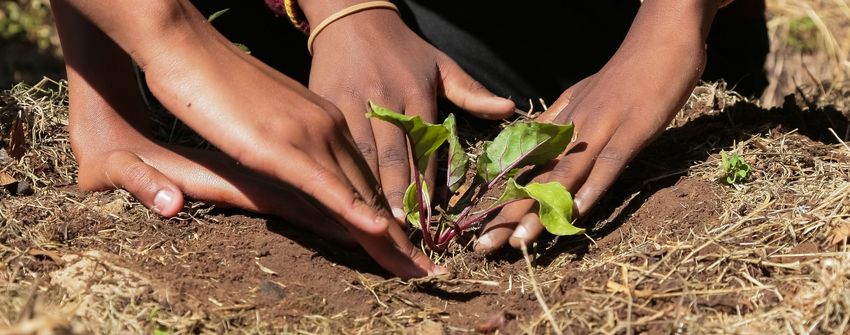
05.12.2021 Proclaimed by the United Nations, the Wold Soil Day is held annually on 5 December. This day is used to stress the importance of soils for food security and to raise awareness for soil degradation and its threat to humans and ecosystems.
Read more >
06.09.2021 In the presence of the Ethiopian Ambassador, H.E. Mulu Solomon Bezuneh, representatives of the Saxon State Chancellery and project managers from DBFZ, the official launch of the "ETH-Soil" project for soil improvement in Ethiopia took place on 6 September. The aim of the five-year project coordinated by DBFZ is to improve food security in three pilot regions in the Oromia region of Ethiopia through the application of biofertilisers from pyrolysis and biogas plants.
17.08.2021 During his visit to the DBFZ on 17 August, Member of the German Bundestag Carsten Körber (CDU) accompanied by Mr Christoph Schmitt (Saxon State Chancellery) informed himself about the scope, details and concrete research developments of the large Ethiopia project "ETH-Soil".
